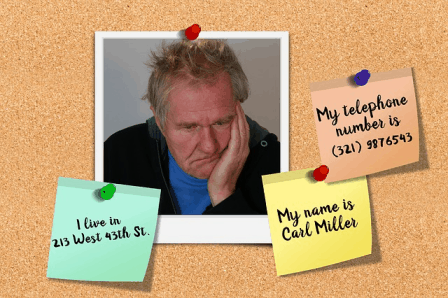
Communicating With Seniors Suffering From Alzheimer’s Disease
This post is also available in: Français (French)
What is it about Alzheimer’s disease that makes it so difficult to communicate? Odd as it may sound, it is neither the effects of dementia that make talking to a loved one challenging, nor the lack of willingness in either party. Rather, the misunderstandings, frustration, and anger stem from not using the correct methods to communicate, especially in the earlier mild to moderate stages of Alzheimer’s when the person suffering from the disease still understands the effect that memory loss has on them.
It is not only a terrifying time for suffers of the disease, but also incredibly frustrating and hurtful when they are misunderstood or disregarded. It is imperative, therefore, that loved ones and caregivers use effective techniques to communicate. It can be difficult finding the right method since Alzheimer’s disease affects everyone differently; what works for one person might not work for another, but it’s definitely worth the effort to find a solution.
How Alzheimer’s Disease Affects Communication
The gradual loss of memory affects a person’s ability to express themselves. In the early stage of Alzheimer’s disease, loved ones will notice the senior switching to more descriptive language rather than specific details, which happens because the elderly sometimes forgets the name of objects. The person might also repeat themselves or get overwhelmed by excessive noise. It is important, however, not to assume that the senior cannot understand others or that they are unable to express their thoughts and desires.
In the middle stage of the disease, communication can become a bigger challenge. The senior will have a harder time understanding others and their own speech might become slower and difficult to decipher at times as well. They might jumble grammar and substitute words with unrelated ones, or get stuck on a certain thought. If English is their second language, many sufferers begin forgetting it and resort to using of their native tongue only. Misunderstandings can occur often, and this can result in the elderly getting frustrated, angry, or depressed; certainly not the desired outcome.
Keeping Alzheimer’s Sufferers Safe
Pulling away from family because of difficult communication and the increasing desire to get away from the source of their frustration could also be dangerous for sufferers of the disease. It could cause the person to leave their home and wander around aimlessly, perhaps even getting lost and confused after setting out. Of course, such wandering is known to occur with Alzheimer’s patients for to a variety of reasons, but it is always smart to try and avoid instigating this urge, as well as to take preventative measures.
Using an alert system with GPS like Ton Ange Gardien SOS senior wrist watch for Alzheimer’s patients is possibly the safest and most effective method of keeping track of elderly loved ones, since not only can they assist in finding the lost relative but they are also able to call for help themselves when they realize they need it, as they often do.
In the late stage of Alzheimer’s disease, it is advisable to encourage and rely on nonverbal communication. Sufferers can express their emotions with sounds, gestures, or facial expressions, and it is important to pay attention to their cues as well as to treat them with the dignity they deserve. Due to the increased risk of accidents due to confusion – and of course from wandering off alone – having a medical alert device is especially advisable.
Tips for Communicating With Alzheimer’s Sufferers
It is important to never treat a person with Alzheimer’s disease as if they aren’t present or as if they were children. They deserve respect and acting as if they are unfit to communicate with is hurtful and unwarranted. Here are some things to consider:
Always address them properly and introduce yourself if necessary.
Find calm, quiet places to talk to avoid confusion and distraction.
Be patient and listen when they speak.
Clarify and help them find words they’re struggling with by repeating your interpretation of their sentences, but don’t correct them directly.
You may also find the need to repeat yourself if the elderly didn’t understand you the first time, but try not to get impatient and rephrase to help them.
Don’t use potentially hurtful language such as ‘remember when…?’ or ‘I just told you…’
Employ the use of gestures, especially in the late stage of the disease, and give clear instructions and cues.
Ask yes/no questions instead of open-ended ones.





